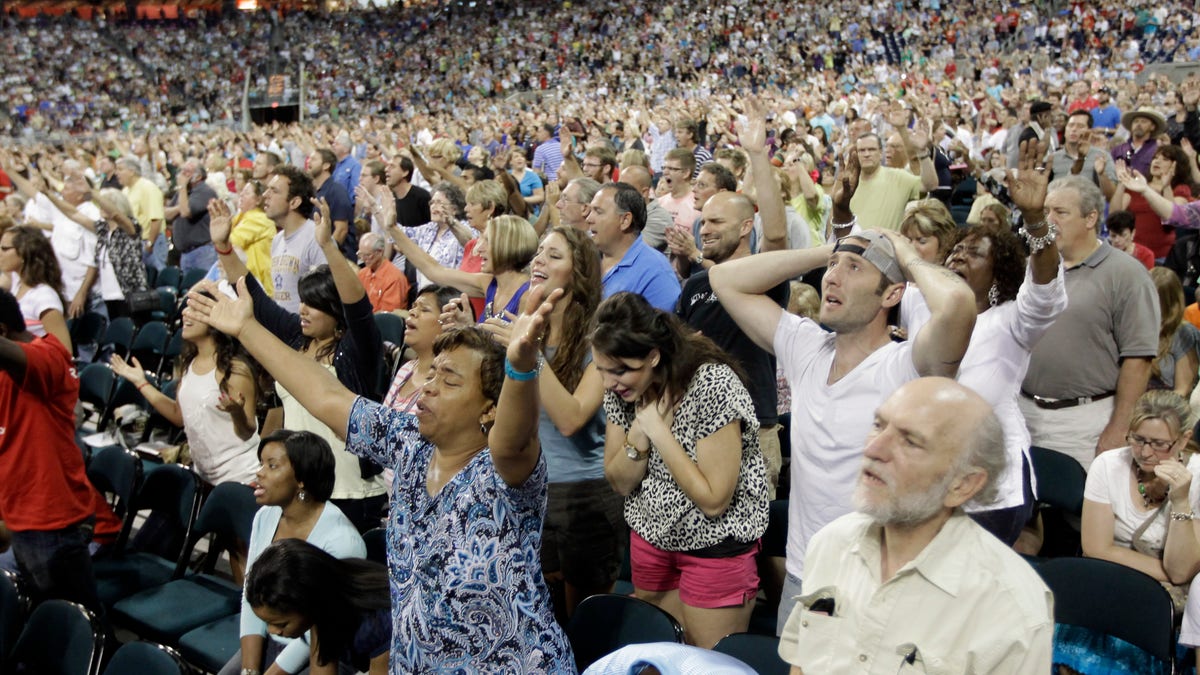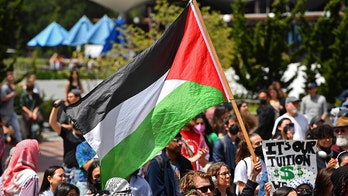
In this Aug. 6, 2011, file photo worshippers pray during The Response, a call to prayer for a nation in crisis in Houston. (AP2011)
Another raucous season for religion and politics has begun.
Last month, Texas Gov. Rick Perry, now a Republican presidential candidate, held a prayer rally for tens of thousands, read from the Bible, invoked Christ and broadcast the whole event on the Web.
There was no symbolic nod to other American faiths. No rabbi or Roman Catholic priest was among the evangelical speakers. It was a rare, full-on embrace of one religious tradition in the glare of a presidential contest.
It used to be simpler. Protestants were the majority, and candidates could show their piety just by attending church.
Now, politicians are navigating a landscape in which rifts over faith and policy have become chasms. An outlook that appeals to one group enrages another. Campaigns are desperate to find language generic enough for a broad constituency that also conveys an unshakable faith.
There is no avoiding the minefield, especially with early primaries in Iowa and South Carolina, where evangelical voters are so influential.
Nationally, more than 70 percent of Republicans and more than half of Democrats say it's somewhat or very important that a presidential candidate have very strong religious beliefs, according to the Public Religion Research Institute.
In 1960, John F. Kennedy could blunt Protestant fears about his Catholicism by calling his religion private. After four decades of culture wars and Christian right activism, the Kennedy strategy no longer works.
Politicians are evaluated not only by what church they attend, but also by what their congregation teaches and what their pastor says on Sundays.
"Candidates often have to make tough choices about their religion -- whether to talk about it, what to say about it and even what to do about it -- such as leaving a church," said John Green, director of the Bliss Institute of Applied Politics at the University of Akron, Ohio. "These tensions are quite strong among Republicans as the presidential nomination contest heats up, partly because of religious disagreements among key constituencies, but partly because of differences in issue priorities -- economic versus social issues."
The current campaign began with two cautionary tales fresh in the minds of political strategists:
In 2008, candidate Barack Obama broke ties with his Chicago pastor, the Rev. Jeremiah Wright, after videos surfaced of Wright sermonizing that U.S. foreign policy played a role in the Sept. 11 attacks.
Republican Mitt Romney was the other example. The former Massachusetts governor had struggled to address concerns about being Mormon despite a major faith-and-values speech in 2007 in Texas.
Even though he commended the deep faith of the Founding Fathers and decried secularism, polls continued to show an unwillingness to vote for a Mormon, especially among white evangelicals.
Romney is once again running for president. He has barely discussed his religion so far.
Politicians are facing complex questions on religious doctrine, prompted in many cases by their own attempts at highlighting their faith.
In a recent GOP debate, Republican Michele Bachmann of Minnesota was asked to explain whether, as president, she would submit to her husband's authority after she said she did during her 2006 congressional campaign. The audience booed the question. Bachmann was tight-lipped as she listened, then thanked the questioner and said that to her, submission means that she and her husband respect each other.
Perry largely dismissed the outcry over his July prayer rally, held the week before he announced he was running for president.
The event was his idea and was financed by the American Family Association, a Tupelo, Miss.-based group whose policy director believes that freedom of religion applies only to Christians.
Religion was so in the foreground in the 2008 presidential race that for their first appearance on the same stage after their party conventions, Obama and Sen. John McCain, R-Ariz., agreed to an event at a church where they would be interviewed by a minister.
The Rev. Rick Warren, founder of Saddleback Church in California, asked the candidates what faith in Jesus meant to them and at what point a baby gains human rights.
For the latter question, McCain answered, "At the moment of conception." Obama joked that the question was "above my pay grade," then went on to explain the moral thinking behind his support for abortion rights. Obama soon after apologized for the way he started his answer, saying he was too flip.
Voters have started pushing for specifics because they no longer consider belief separate from action and faith unrelated to policymaking, said Kathleen Flake, who specializes in American religious history at Vanderbilt University. The nation's Catholic bishops, more vocal than ever on the duty of Catholic lawmakers to follow church teaching, underscored that way of thinking. Bishops have said repeatedly that a true Catholic cannot support any policy that allows abortion.
"The voting public no longer believes, as they did as late as the 1950s, that religion was about what you thought and not what you did," Flake said.
For the 2012 race, analysts predict that Romney will eventually have to talk about how his faith would influence the way he governs.
Former Utah Gov. Jon Huntsman, a 2012 contender, is perhaps the first presidential candidate claiming the "spiritual, not religious" mantle.
He was raised Mormon but said he is not very active in The Church of Jesus Christ of Latter-day Saints. Huntsman's wife, Mary Kaye, who was raised Episcopalian, told Vogue magazine, "We are a family that combines the two, and it works for us."
The Associated Press contributed to this report.




